By Matt Koper/ne news editor
Teachers, students attempt to reconcile textbook with Bible
Evolution.
A topic that finds its basis in scientific facts, research and theories is polarizing because it separates itself from the Christian idea of creationism. This can cause issues for the creationists learning and teaching the material.
NE student Morgan Gaddy, a member of the Student Baptist Ministry, said she doesn’t believe in the theory of evolution but will listen to the other side’s argument.

Photos by Brendon James
“I believe in creationism, so I hold strong and dear to that,” she said. “I also do like to understand the different sides. It’s interesting to hear what they do think, so some parts I do agree with. But my thing with evolution is that it’s not absolute because everything is changing. They are still trying to find different things.”
Gaddy said she doesn’t believe evolution started by chance and that if it did, life would lose its meaning.
“I can’t believe that it’s all chance and this just happened from a big bang because it seems like life is meaningless and it isn’t important because there’s no purpose,” she said. “If it happened on accident, that means we all just kind of showed up. There’s nobody to say, ‘Oh, Morgan, this is where I put you, and I planned this life for you.’”
NE geology assistant professor Hayden Chasteen, who has taught geology for 27 years, said he has never had any issues with the topic because he was raised in the church.
“My dad’s a preacher,” he said. “I grew up in the Southern Baptist church. So I come from that background, but I’ve never had a problem with the teaching of evolution. And the reason for that is because I’ve always approached science and religion as being opposite sides of the same coin. Probably the biggest thing, the reason I don’t have a problem with it, is because I am not a literalist when it comes to the Bible.”
Chasteen said the way the early scriptures of the Bible are structured is similar to the theory of evolution.
“Particularly if you look at order of the first creation of the Bible, which is in Genesis 1, the order of that is almost exactly the same as evolution,” he said. “Things in the ocean first, and then things on land and the birds, large animals and then the people were the last thing. So it’s pretty much in the same kind of order that we talk about evolution-wise.”
Gaddy said she has an issue with how evolution is presented in class as the only explanation for the universe’s origins.
“I mean she kind of taught it as like that’s the only theory, and that’s it,” she said. “There’s nothing else that could’ve happened. Evolution was the truth, basically. So that part I didn’t agree with. She kind of went off on ‘This is fact,’ and everything else is false.”

Chasteen said he has had students in years past that have caused disruptions in class, but they’re rare occurrences.
“Of course, I tell everybody at the beginning of class that I’m not there to change their belief systems, that I’m there to give them information, and then they have to figure out how it fits in their belief system,” he said. “I’ve had students that have come up to me and said, ‘I’m not gonna believe any of this,’ and I said, ‘Fine, you still have to know it for the test.’”
Gaddy said during the lecture on evolution, she would only listen mainly for the purpose of taking the test and holds strong to her beliefs, regardless of what is being taught.
“I’ll listen to it, understand it, try to get their view on it, their perspective, why they believe that,” she said. “And at the end of the day, you kind of have to come up with the belief on your own.”
Chasteen said he keeps the conversation to those questioning evolution in class on the scientific aspect and won’t get into religious ideas.
“I always tell them we are going to discuss science in class, and if you wanna discuss religion, we’ll do that in my office,” he said.
Creationism vs. science
NE physical sciences adjunct instructor Dale Johnson, who is an evangelical Christian, said he is currently in an ongoing discussion about the topic with one of his students — Kate Adams, who is a creationist and a member of the Baptist church.
Adams has given her professor a book called New Answers, a 25-chapter book that presents information on the topic of evolution versus the big bang theory.
Johnson said he still has questions about creationism because he believes in God and the theory of evolution instead of the Biblical version of creationism that the book hasn’t touched on.
“I’ve got a new question for them that I’ve been thinking about these days, and this book hasn’t addressed this,” he said. “And that is, if the earth is 6,000 years old, and everything is explained by Noah’s flood, if Noah saved all the land animals and he saved the dinosaurs, then why are there no dinosaur bones above the ground? Two. Fossilized bones are rocks. The bodies that were found at Pompeii after Vesuvius blew up, we know the age of those bodies — 2,000 years ago.”
Adams said science backs up creationism in that petrifying of trees is evidence that science struggles to explain as well as the lack of modern fossilized fish due to rotting before they can harden.
“Present-day modern science cannot observe trees being petrified because it takes very specific conditions for that,” she said. “And a worldwide flood would petrify trees in the sense the Bible explains. Another problem is that there are fossils of fish, and in modern science, fish aren’t fossilized because when they die, the carbon disintegrates and they pretty much rot before they have a chance to fossilize.”
Johnson said he is unsure that there was no death or sin before Adam bit into the fruit in the Garden of Eden, he said.
“The question of whether or not there was death before, that’s your argument for [creationism] is there can’t have been these millions of years, there had to be death before Adam and Eve,” he said. “And that’s not what the Bible says. Death entered when he committed the sin.”
Adams said the theory of evolution shouldn’t be taught as fact because the scientific laws in place are counterproductive.
“There’s certain laws of science, like the law of thermodynamics, which directly contradicts evolution. Evolution is based on the theory of life becoming more complex over time, and energy being created and the big bang. Energy cannot be created nor destroyed. And evolution is based on the principle of energy being created and advancing even.”
Religion in schools
NE student Eunsung Lee, who believes in some form of a higher being, but no particular religion, said schools shouldn’t teach creationism with evolution.
“I believe schools should teach evolution,” he said. “If people who are religious will be going to church, and when they are attending church, church will teach them about creationism. School sciences will teach you about evolution. If you are not religious, and you don’t go to church, you really don’t care about creationism. You don’t have a reason to learn about creationism.”
Lee said religion has seen an ideological shift in that it now accepts science as part of faith because religious leaders have learned evolution in the classroom.
“They learn science and evolution and match it with the Biblical stories that they know, which is now why I think religion accepts science,” he said, “They believe that science is part of their religion. Because they’ve been taught, they understand it. But they don’t want to lose their faith, so they make that part of their faith.”
Lee said that creationism is a concept that is hard to teach because it revolves around the idea of faith.
“All religion is, is just faith,” he said. “You can’t really be taught how to be faithful. You can’t learn faith.”
Chasteen said education is about finding how what you are taught fits into your own life.
“To me, education is about always finding out how the information that you’re learning fits into your own world view,” he said. “If you are not doing that, you’re not getting an education. You’re just taking courses.”


















